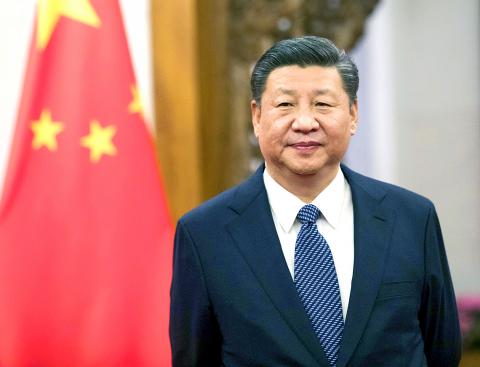The Chinese Communist Party (CCP) has proposed scrapping term limits for the country’s president, Xinhua news agency said yesterday, appearing to lay the groundwork for CCP General Secretary Xi Jinping (習近平) to remain as president beyond 2023.
The CCP Central Committee proposed removing from the constitution the expression that China’s president and vice president “shall serve no more than two consecutive terms,” Xinhua said.
“Xi Jinping has finally achieved his ultimate goal when he first embarked on Chinese politics — that is to be the Mao Zedong (毛澤東) of the 21st century,” said Willy Lam (林和立), a political analyst at the Chinese University in Hong Kong.

Photo: EPA-EFE
Xi, 64, cemented his status as the most powerful Chinese leader since Mao in the 1970s at last year’s twice-a-decade CCP National Congress, where his name and a political theory attributed to him were added to the party constitution as he was given a second five-year term as general secretary.
It was the latest move by the party signaling Xi’s willingness to break with tradition and centralize power under him. Xi has taken control of an unusually wide range of political, economic and other functions, a break with the past two decades of collective leadership.
“What is happening is potentially very dangerous because the reason why Mao Zedong made one mistake after another was because China at the time was a one-man show,” Lam said. “For Xi Jinping, whatever he says is the law. There are no longer any checks and balances.”
Xi is coming to the end of his first five-year term as president and is set to be appointed to his second term at an annual meeting of the National People’s Congress that starts on Monday next week. The proposal to end term limits is likely be approved at that meeting.
Term limits on officeholders were included in the 1982 constitution, when lifetime tenure was abolished.
Political analysts said the party would likely seek to justify the proposed removal of the presidential term limit by citing Xi’s vision of establishing a prosperous, modern society by 2050.
“The theoretical justification for removing tenure limits is that China requires a visionary, capable leader to see China through this multi-decade grand plan,”’ Lam said.
“But the other aspect of it could just be Mao Zedong-like megalomania; he is just convinced that he is fit to be an emperor for life,” he said.
Beijing Institute of Technology economics professor and political commentator Hu Xingdou (胡星斗) said while Xi might need an extra five-year term or two to carry out his plans, the country is unlikely to return to an era of lifetime tenure for heads of state.
“This is beneficial to pushing forward reforms and the fight against corruption, but it’s impossible for China to have lifetime tenure again,” Hu said.
The CCP Central Committee is scheduled begin a three-day meeting in Beijing today to discuss major personnel appointments and other issues.

LONG FLIGHT: The jets would be flown by US pilots, with Taiwanese copilots in the two-seat F-16D variant to help familiarize them with the aircraft, the source said The US is expected to fly 10 Lockheed Martin F-16C/D Block 70/72 jets to Taiwan over the coming months to fulfill a long-awaited order of 66 aircraft, a defense official said yesterday. Word that the first batch of the jets would be delivered soon was welcome news to Taiwan, which has become concerned about delays in the delivery of US arms amid rising military tensions with China. Speaking on condition of anonymity, the official said the initial tranche of the nation’s F-16s are rolling off assembly lines in the US and would be flown under their own power to Taiwan by way

‘OF COURSE A COUNTRY’: The president outlined that Taiwan has all the necessary features of a nation, including citizens, land, government and sovereignty President William Lai (賴清德) discussed the meaning of “nation” during a speech in New Taipei City last night, emphasizing that Taiwan is a country as he condemned China’s misinterpretation of UN Resolution 2758. The speech was the first in a series of 10 that Lai is scheduled to give across Taiwan. It is the responsibility of Taiwanese citizens to stand united to defend their national sovereignty, democracy, liberty, way of life and the future of the next generation, Lai said. This is the most important legacy the people of this era could pass on to future generations, he said. Lai went on to discuss

MISSION: The Indo-Pacific region is ‘the priority theater,’ where the task of deterrence extends across the entire region, including Taiwan, the US Pacific Fleet commander said The US Navy’s “mission of deterrence” in the Indo-Pacific theater applies to Taiwan, Pacific Fleet Commander Admiral Stephen Koehler told the South China Sea Conference on Tuesday. The conference, organized by the Center for Strategic and International Studies (CSIS), is an international platform for senior officials and experts from countries with security interests in the region. “The Pacific Fleet’s mission is to deter aggression across the Western Pacific, together with our allies and partners, and to prevail in combat if necessary, Koehler said in the event’s keynote speech. “That mission of deterrence applies regionwide — including the South China Sea and Taiwan,” he

UNPRECEDENTED: In addition to the approved recall motions, cases such as Ma Wen-chun’s in Nantou are still under review, while others lack enough signatures The Central Election Commission (CEC) announced yesterday that a recall vote would take place on July 26, after it approved the first batch of recall motions targeting 24 Chinese Nationalist Party (KMT) lawmakers and Hsinchu Mayor Ann Kao (高虹安). Taiwan is in the midst of an unprecedented wave of mass recall campaigns, following a civil society push that echoed a call made by Democratic Progressive Party (DPP) caucus whip Ker Chien-ming (柯建銘) in January to initiate signature drives aimed at unseating KMT legislators. Under the Civil Servants Election and Recall Act (公職人員選舉罷免法), Taiwanese can initiate a recall of district-elected lawmakers by collecting